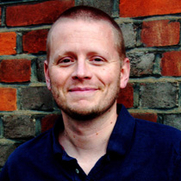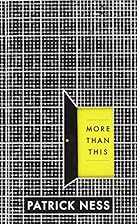 Some excerpts from our interview with Patrick Ness, which appeared in the October State of the Thing.
Some excerpts from our interview with Patrick Ness, which appeared in the October State of the Thing.
Patrick is the author of several books for young adults, including The Knife of Never Letting Go and the Carnegie Medal-winning Monsters of Men and A Monster Calls. His new book, More Than This, was published by Candlewick in September.
I don’t want to ask for a nutshell version of More Than This, since so much depends on the mysteries that the reader has the chance to unpack, but will you give us a sense of how the book begins, at least?
Well, the first line is “Here is the boy, drowning” and he does, unambiguously, die. So where does he wake up on the next page then? Don’t really want to say any more than that, really!
Was there a specific idea or incident that inspired the story?
I always wanted to write a book where someone wakes up and the world is empty. So the next question is why? And that opened up a whole realm of possibilities and other questions, which is what I find exciting. I also wanted to write a book about yearning, about yearning for more than just your own life, because I think that’s such a painful and poignant universal teenage experience. Then I just sort of went from there to see where the story would take me.
What’s your favorite line (or scene) from the book?
I don’t want people to turn to it first! But I’m really proud of the last line. To me, the whole book rests on it and it’s got everything I want the book to be about in it. But read the first 480 pages first, please.
 What do you think it is about dystopian writing that works so well for YA/teen audiences?
What do you think it is about dystopian writing that works so well for YA/teen audiences?
I’ve always thought it was because dystopias are about a world where society has suddenly collapsed, where the rules are arbitrary and unknowable, where people are divided into groups, and your friends are both beloved and duplicitous. In short, it’s high school. I don’t think teenagers look as dystopia as fiction; they see it as a pretty accurate description of what their current world feels like.
When and where do you do most of your writing? Are there any particular writing habits or practices you’ve found useful?
I work at home and in the London Library. And I do have a few habits—1000 words a day, working to goal rather than time, etc.—but it’s a really important thing that no one can tell you how to write; they can only tell you how they write and that’s an important difference. The things I do may be of no use to you at all, but that’s absolutely fine. As long as you get the writing in, you’re doing it right.
For more on Patrick’s work, favorite books, and what we can expect to see from him next, check out our full interview.
Labels: author interview, authors



0 Comments: